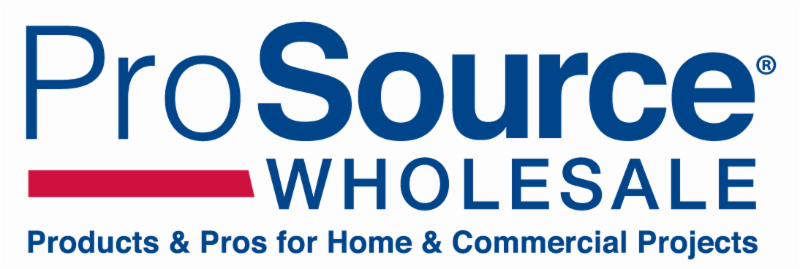When it comes to selecting the right flooring for your space, the options can be overwhelming. Each flooring type offers unique advantages and drawbacks, making the decision a matter of personal preference, practicality, and aesthetic appeal. In this guide, we'll break down the pros and cons of popular flooring choices, helping you make an informed decision that suits your lifestyle and design vision.
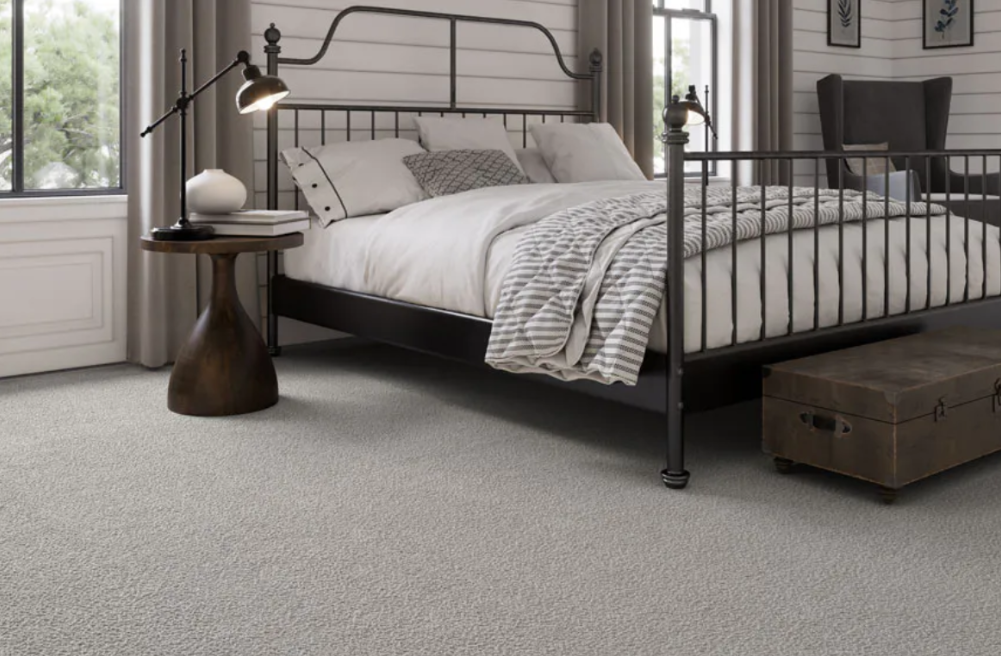
Image: Phenix Carpet
Carpet
Pros:
- Comfort: Carpet provides a soft and warm underfoot feel, making it a cozy choice for bedrooms and living rooms.
- Sound Insulation: It absorbs sound, reducing noise transmission between floors and rooms.
- Aesthetic Variety: Available in numerous colors, patterns, and textures to complement any décor.
Cons:
- Maintenance: Carpet requires regular vacuuming and occasional professional cleaning to prevent dust and allergens from accumulating.
- Stains: Spills can leave lasting stains on carpets, necessitating quick and careful cleaning.
- Durability: High-traffic areas can wear down carpet fibers over time, leading to signs of aging.
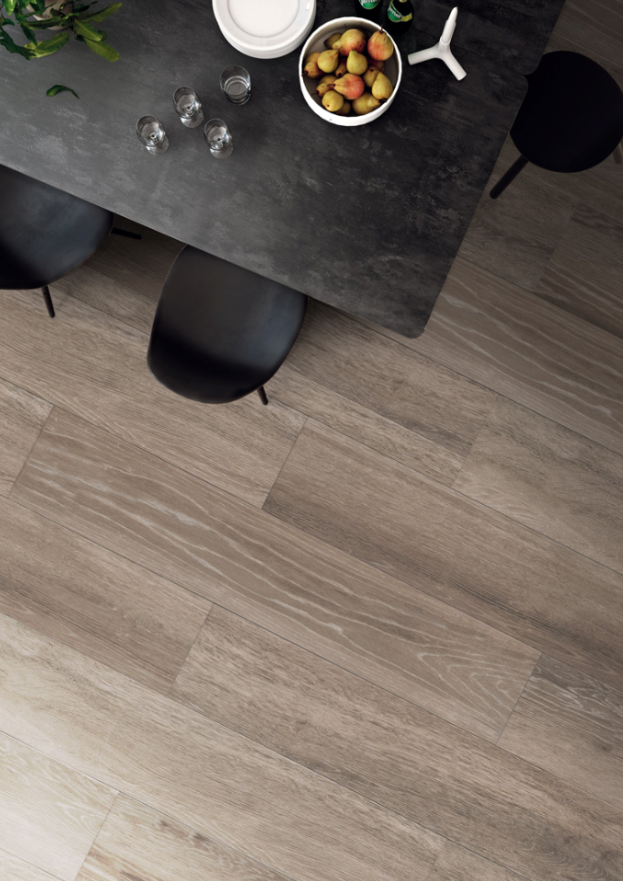
Image: Emser Angeles, wood plank porcelain tile, color Crest
Tile Flooring (Porcelain vs. Ceramic)
Porcelain Tile
Pros:
- Durability: Porcelain is known for its exceptional durability and resistance to wear and tear, making it suitable for high-traffic areas.
- Moisture Resistance: Porcelain is highly impervious to water, making it a smart choice for bathrooms, kitchens, and other wet areas.
- Design Variety: Porcelain tiles come in an extensive range of designs, including styles that mimic natural stone and wood.
- Longevity: Due to its durability, porcelain tiles can last for many years, providing long-term value.
Cons:
- Cost: The manufacturing process and quality of porcelain can make it pricier than other tile options.
- Installation Difficulty: Due to its density, porcelain can be more challenging to cut and install, potentially requiring professional installation.
- Coldness: Like all tile, porcelain can feel cold underfoot in colder environments.
Ceramic Tile
Pros:
- Affordability: Ceramic tiles are generally more budget-friendly than porcelain, making them a cost-effective choice for flooring.
- Design Variety: Just like porcelain, ceramic tiles come in a wide array of colors, patterns, and sizes to match your style.
- Ease of Installation: Ceramic tiles are easier to cut and work with, which can make DIY installation more manageable.
- Moisture Resistance: While not as impervious as porcelain, ceramic tiles are still suitable for most wet areas.
Cons:
- Durability: While durable, ceramic tiles are not as tough as porcelain and may be more susceptible to cracking under heavy impact.
- Moisture Absorption: Compared to porcelain, ceramic tiles can absorb more moisture, potentially leading to staining over time.
- Longevity: Due to their slightly lower durability, ceramic tiles might not last as long in high-traffic areas.
- Installation Complexity: The lighter weight and lower density of ceramic tiles can sometimes make them more challenging to install on certain surfaces.
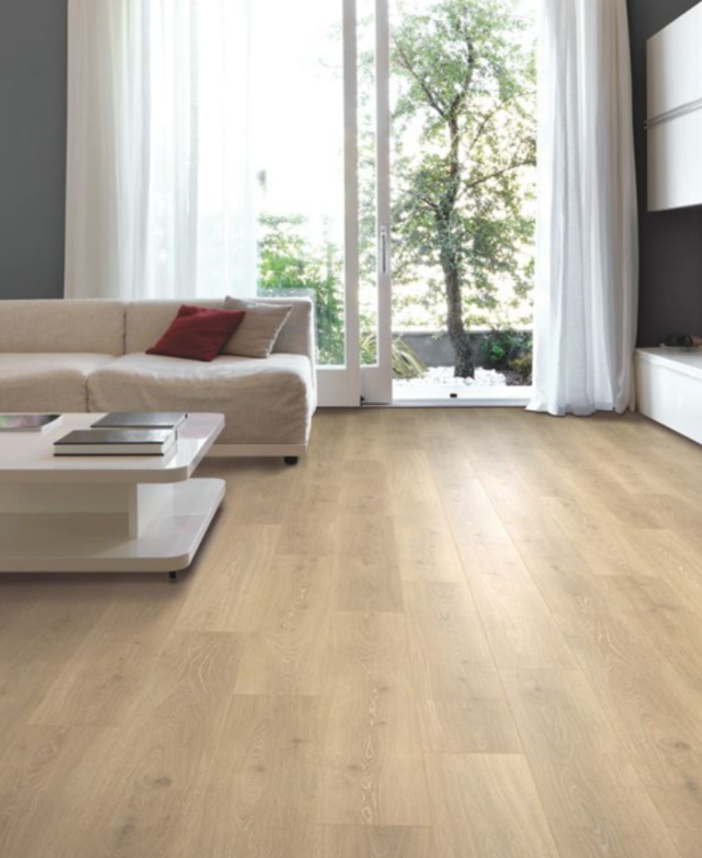
Image: Mohawk Boardwalk Collective, color Sand Dune
Laminate Flooring
Pros:
- Affordability: Laminate is a budget-friendly alternative to hardwood or stone flooring.
- Versatility: Mimics the look of natural materials, offering a wide range of styles and designs.
- Durability: Highly resistant to scratches and stains, making it suitable for busy households.
Cons:
- Moisture Sensitivity: Laminate can be damaged by excessive moisture, so it's not always ideal for wet areas like bathrooms.
- Limited Repairability: Unlike hardwood, laminate cannot be refinished; damaged sections must be replaced.
- Sound: It can produce a hollow sound when walked on, which may be undesirable to some.
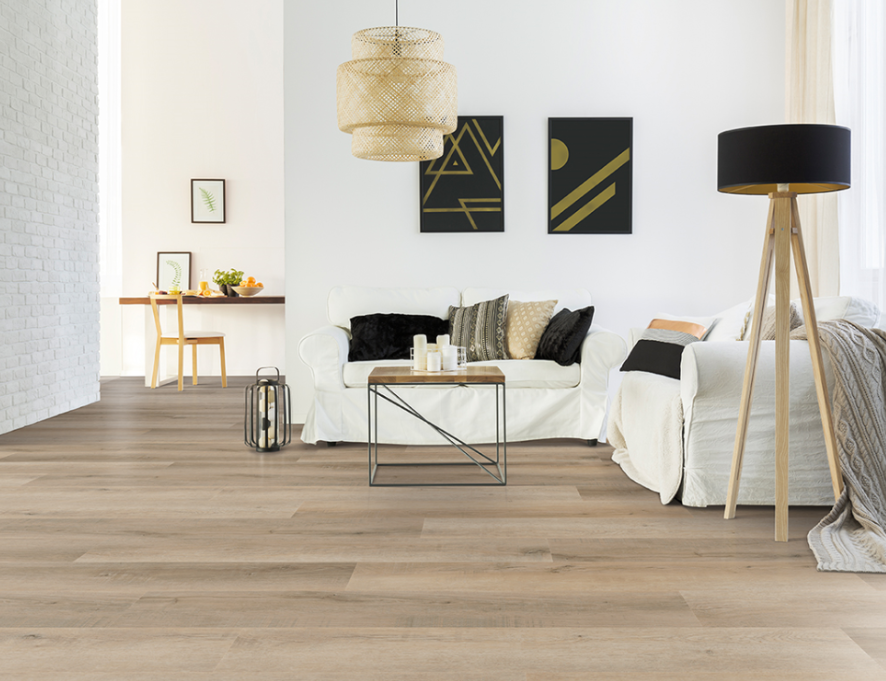
Image: COREtec Shire Plus, color Indy
Luxury Vinyl Plank (LVP) Flooring
Pros:
- Waterproof: LVP is highly resistant to moisture, making it ideal for kitchens, bathrooms, and basements.
- Durability: Can withstand heavy foot traffic and is scratch-resistant.
- Realistic Appearance: LVP closely replicates the look of hardwood or natural stone.
Cons:
- Environmental Impact: Some LVP products may have environmental concerns due to their composition.
- Installation: While some types are easy to install as a DIY project, professional installation is recommended for optimal results.
- Comfort: LVP is harder underfoot compared to carpet, which might be less comfortable for some individuals.
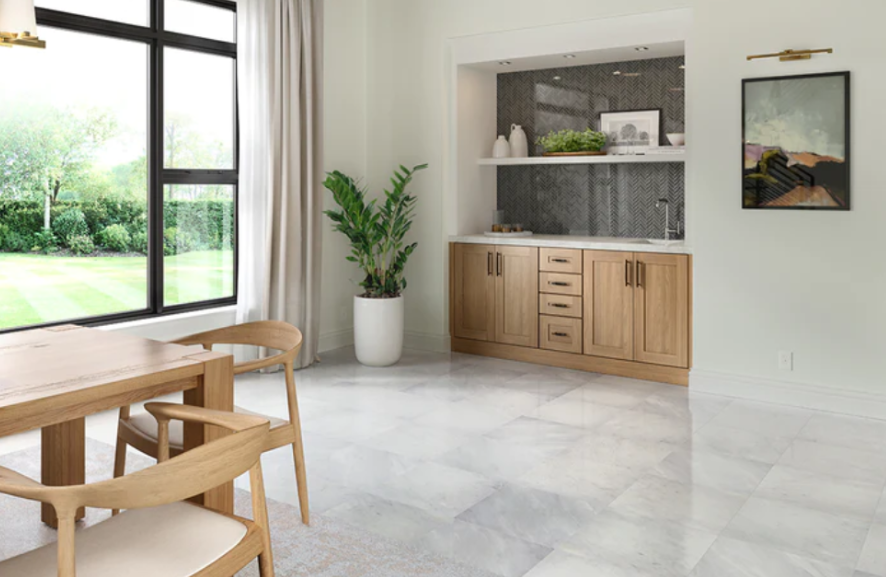
Image: Emser Marble, color Winter Frost
Natural Stone Flooring
Pros:
- Elegance: Natural stone, like marble or granite, offers a luxurious and unique appearance.
- Durability: Stone is incredibly long-lasting and can age beautifully.
- Heat Resistance: Ideal for areas with radiant heating systems due to its heat-retaining properties.
Cons:
- Cost: Natural stone can be among the most expensive flooring options due to the material and installation costs.
- Maintenance: Depending on the type of stone, maintenance requirements can vary, and some stones can be prone to staining.
- Coldness: Like tiles, natural stone can feel cold underfoot.
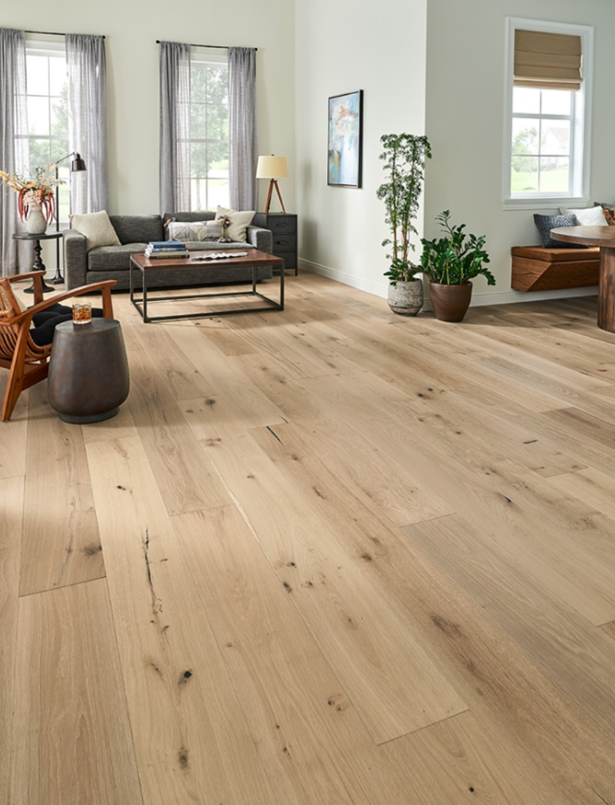
Image: Mannington Sanctuary, color Shell
Engineered Hardwood Flooring
Pros:
- Aesthetic: Engineered hardwood boasts the appearance of real wood, adding warmth and character to your space.
- Stability: Its layered construction resists warping, and expansion caused by changes in humidity.
- Installation Versatility: Can be installed over various subfloors, including concrete.
Cons:
- Cost: While more affordable than solid hardwood, engineered hardwood can still be a significant investment.
- Limited Refinishing: Depending on the thickness of the top layer, it may have a limited number of refinishing cycles.
- Moisture Sensitivity: Engineered hardwood, like any wood product, can be sensitive to moisture, so it's not suitable for wet areas.
In the end, selecting the right flooring comes down to your preferences, needs, and budget. By understanding the pros and cons of each flooring type, you can make an informed choice that transforms your space into a haven of style, comfort, and practicality. At Prosource, we're here to assist you every step of the way. Our dedicated account managers, who are flooring experts, can provide you with all the information you need and guide you towards making the right choice. Whether you're looking for porcelain, ceramic, or any other flooring option, we're here to ensure your space receives the best flooring solution.
